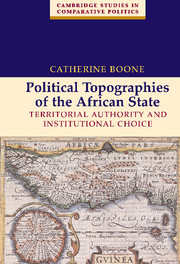Book contents
- Frontmatter
- Contents
- List of Maps, Tables, and Figures
- Preface and Acknowledgments
- 1 INTRODUCTION
- 2 MAPPING POLITICAL TOPOGRAPHY IN AFRICA
- 3 UNEVEN INSTITUTIONAL TOPOGRAPHY WITHIN ONE STATE
- 4 TAXING RICH PEASANTS: REGIME IDEOLOGY AS STRATEGY
- 5 THE GEOPOLITICS OF LATE DEVELOPMENT
- 6 CONCLUSION
- Appendix: A Note on Sources, Evidence, and Measurement
- References
- Index
- Cambridge Studies in Comparative Politics
6 - CONCLUSION
Published online by Cambridge University Press: 26 December 2009
- Frontmatter
- Contents
- List of Maps, Tables, and Figures
- Preface and Acknowledgments
- 1 INTRODUCTION
- 2 MAPPING POLITICAL TOPOGRAPHY IN AFRICA
- 3 UNEVEN INSTITUTIONAL TOPOGRAPHY WITHIN ONE STATE
- 4 TAXING RICH PEASANTS: REGIME IDEOLOGY AS STRATEGY
- 5 THE GEOPOLITICS OF LATE DEVELOPMENT
- 6 CONCLUSION
- Appendix: A Note on Sources, Evidence, and Measurement
- References
- Index
- Cambridge Studies in Comparative Politics
Summary
It is ironic that in African countries centered on the production of export crops, central rulers in the 1960s through 1980s relied most heavily for political support on the constituencies they hoped to tax the hardest – the peasants. For all the talk of “urban bias” in postcolonial Africa, the fact remained that rural constituencies and electorates provided these regimes with the ballast they needed to sustain attacks from the unions, intellectuals, students, lumpenproletarians, and even civil servants in the cities. This dynamic was in clear evidence after 1990, when internal and external pressures to move toward multipartism, and to reform the local state via administrative and political decentralization, gave rulers new occasion and new impetus to return to the rural areas to mobilize rural electorates. Regimes founded by Senghor, Houphouet, and Nkrumah sought to renew the electoral mandates they had received at the outset, in the 1950s, and to counterbalance the urban-based opposition that organized under the banners of pro-democracy movements. In striking and decisive ways, politics in the current era revisits the founding crises of the postcolonial African state.
John Lonsdale wrote in 1980 that there were three sources of variation in postcolonial Africa's political experience: the nature of the colonial regime, the political character of the nationalist movement, and the organization and dynamics of indigenous rural societies (Lonsdale 1981).
- Type
- Chapter
- Information
- Political Topographies of the African StateTerritorial Authority and Institutional Choice, pp. 318 - 352Publisher: Cambridge University PressPrint publication year: 2003

